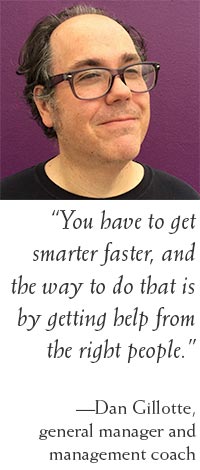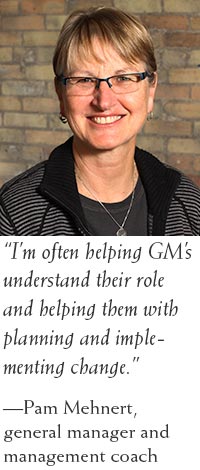In a competitive economy with slim profit margins, hiring a consultant or a coach can feel like a luxury line item. Yet feeling overtasked and having to do more with less is the perfect reason for hiring a coach. Coaches can help leaders prioritize and focus their energies, leverage their skills, and learn new ways to respond to both interpersonal and marketplace demands. In the long run it is very cost-effective because coaching benefits performance and the bottom line.
“Being a leader now is tougher than ever. Job market changes mean that you often have to think about doing things differently,” said Pam Mehnert, a general manager, coach and leadership development consultant who specializes in Interest Based Problem Solving. “Having a coach helps you grow and build confidence. When I’m coaching, I’m often helping GM’s understand their role and helping them with planning and implementing change.”
So, what happens in a coaching relationship? In addition to tailoring coaching around specific needs, in general a management coach works with clients to:
- Develop personal and workplace accountability
- Clarify goals
- Improve skill areas
- Provide mentoring
“Coaching isn’t therapy, and it isn’t training. It’s having someone you trust to help you be accountable to yourself. When I work with clients, we do an assessment of their skills and areas where they want to improve.” Mehnert doesn’t believe in “cookie-cutter” solutions, and every session is about building follow-up and accountability into the relationship. “I like to assign homework and have clients practice the things they want to work on.”
As an experienced manager, Mehnert knows very well how challenging the job can be, too, and having support for that is invaluable. “One of the main benefits of coaching is just having someone to talk to. And sometimes you need someone to cheer you on. The GM’s work can go on without notice, and often there is nobody praising you for what you accomplish. Having a coach is an intangible benefit that can really affect everyone’s morale.”
Mehnert said positive morale can take an organization very far. “The community, staff, owners, partners, the city, professionals, there are so many layers of relationships that are critical to the business—and coaching can help a GM rise to that level.”
Dan Gillotte, a general manager coach, agrees that feeling supported is a powerful motivator—for anyone, no matter what job they do. “Yet the loneliness of the general manager role can be alleviated through mentors and coaches, and a lot of people find success in their jobs through that.”
 Gillotte acknowledges a lot has changed in the grocery industry, but he thinks a consistent emphasis on mastering retail basics and management leadership skills will always be relevant. “I think the job of the general manager is to be the creator of culture and the setter of standards. Setting expectations and creating alignment is a big part of the GM job. You need to really own that role.”
Gillotte acknowledges a lot has changed in the grocery industry, but he thinks a consistent emphasis on mastering retail basics and management leadership skills will always be relevant. “I think the job of the general manager is to be the creator of culture and the setter of standards. Setting expectations and creating alignment is a big part of the GM job. You need to really own that role.”
And that’s where getting coaching support pays off. A coach helps leaders focus on the big picture as well as seeing things from the perspective of front-line staff. “I still seek help. I believe every great GM seeks advice and feedback in a coaching relationship with others.”
A question Gillotte often asks clients is how good is the next level of management beyond you? It’s important that leadership also develop enough resilience and strength in their management teams. “That’s also part of the job as the GM, because there are a lot of parts in the organization that move without you.”
Pam Mehnert also thinks making this aspect of leadership development an organizational priority will pay off in the future. “We need to work with our managers so they can continue to excel and grow. It’s important to identify our rising stars and plan to invest in them.” She finds that the biggest skill gap for new leaders, especially department heads, is developing their supervision capacity. The inability to skillfully hold people accountable can turn into big challenges in co-op culture and can impact profitability.
Managing the co-op on behalf of a community is a big job, and its leaders need to be supported. Dan Gillotte said, “As the leader everything you do is on behalf of the owners, and the role is to make things happen, to do both planning for the future and keeping the co-op on track day-to-day. The reality today is that you have to get smarter faster, and the way to do that is by getting help from the right people.”
Have more questions?
Get in touch with one of our consultants.

